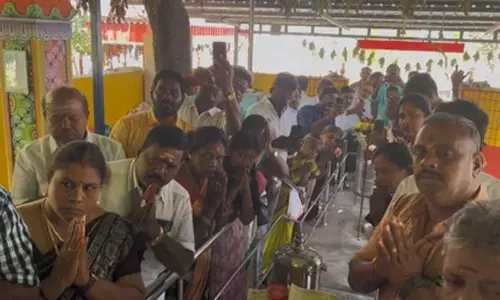UCC implementation can be a tricky affair

The discerning reader would no doubt have noticed that the piece that appeared in this column the previous week was narrated by the first person singular.
The discerning reader would no doubt have noticed that the piece that appeared in this column the previous week was narrated by the first person singular. That was largely on account of the fact that the experiences narrated, and the views expressed in it were of a personal nature. So it is, again, this week.
I write this piece as I travel by road back to Hyderabad from Warangal, where I had been to participate in the Platinum Jubilee celebrations of AVV Educational Institutions. Vice President M Venkaiah Naidu was the Chief Guest, curiously enough, personally, I am approaching my own Platinum year too!
This week's piece, however, is not about an individual, or an institution, but about an issue which is of about the same vintage, namely the question of putting in place a Uniform Civil Code (UCC) in the country.
The UCC has been at the centre of a political and legislative debate for over a century-and-a- half now. India is home to nearly every known religion, Hinduism, Islam, Christianity, Zoroastrianism, Judaism, Buddhism, Jainism, Sikhism etc.
The scriptures of these religions, and the customs of the communities following them, determine to a large extent, the provisions of the personal laws governing issues such as marriage, divorce, succession, inheritance and adoption and other related family and community matters.
And UCC, which is constitutionally mandated, as one of the Directive Principles of State Policy, aims to replace them all by a set of common and secular rules, which will govern all the citizens of the country, irrespective of their religion, caste and tribe.
Article 44 of the Directive Principles of the Indian Constitution, no doubt advocates UCC to all citizens. But the question that arises is, how does one make certain laws applicable to all citizens without affecting adversely the fundamental right to practise one's own religion, also a constitutional right guaranteed by Articles 25 to 28 of the Constitution. Touching, as it does, both the areas of secularism as well as fundamental rights, it has, naturally enough, become one of the most controversial subjects of national importance today.
Unity in diversity has always been the hallmark of our country's inner strength. However, the provisions of many personal laws such as the Hindu Marriage Act, the Muslim Personal Law, the Indian Christian's Marriage Act, the Indian Divorce Act, the uncodified personal marriage laws of the Jews and the Parsi Marriage and Divorce Act etc., vary widely on the basis of their sources, philosophy and application.
Thus, not only does adjudication, by the judiciary, of issues arising out of the application of these laws get complicated, but there is inherent difficulty in, and resistance to, applying a set of common rules to such diverse religious and ethnic groups.
The objectives of UCC include the need to strengthen the secular fabric, the unity and the integrity of the country, rejection of the concept of different laws of different communities, the importance of gender equality and the need to reform the somewhat archaic personal laws of some religious minorities.
They are indeed commendable. Courts of law have, in fact, adopted such a spirit in delivering verdicts relating to issues such as maintenance of a divorced woman. If put in place, it will also bring harmony in the legal regime and prove conducive to efficiency and transparency in their application.
But the prospect is not without the attendant reservations and concerns. For instance, the most commonly expressed fears are that UCC may prove to be an intrusion into religious beliefs or that it will adversely impact on the extant arrangements relating to reservations in education and employment.
As we noted earlier, the idea of a UCC has been doing the rounds since as long ago as the 1930s. That it is still work in progress is largely on account of the inability of successive Central governments to hammer out a consensus in regard to the agreed common ground between the two extreme positions.
For instance, we have Amartya Sen at one end saying that there is nothing non-secular or sectarian about it, while CK Matthew, a retired civil servant, advises against forcing it on unwilling people and suggests voluntary adoption. The courts of law have always been in favour of UCC.
Justice RM Sahay said "......religious practices, violative of human rights and dignity and sacerdotal suffocation of essentially civil and material freedom or not freedom but oppression. Therefore, a uniform code is imperative both for protection of the oppressed and for promotion of national unity and solidarity".
At this stage, it is worth noting that the need for organising harmony between different communities and religions has also been felt in countries such as Israel, Japan, Russia and France. In fact, even within India, the State of Goa, after Independence, adopted the Portuguese Civil Code which enforced a UCC for all its citizens.
If one sits back, and takes a look at the big picture, one reaches the inevitable conclusion that most socio-political decision-making is in the grey area. The UCC is as desirable from the global point of view of harmony, national integration, transparency and ease of administration, as it is dangerous and risky to attempt to rush it through without creating an atmosphere of consensus and an environment of agreement.
That UCC is, as Shakespeare would have put it, "a consummation devoutly to be wished for," can hardly be disputed. Whatever form it takes, I trust that it will be a just and fair dispensation, striking an acceptable balance between the need to protect fundamental rights and the religious beliefs of different communities.
My city of Hyderabad is an almost perfect image of what the Constitution makers must have dreamt of when they drafted Article 46. It is a little like a miniature India, with all communities, religions and ethnic groups living in an atmosphere of mutual understanding, peace and tranquility.
Its serenity is upset only by the (thankfully) rare attempts by lawless elements, backed by vested interests to create artificial disturbances .One fervently hopes that any future development, even if it does not make the city a better place, will at least leave it in the state of harmony and unity in which it is now.
(The writer is former Chief Secretary, Government of Andhra Pradesh)














